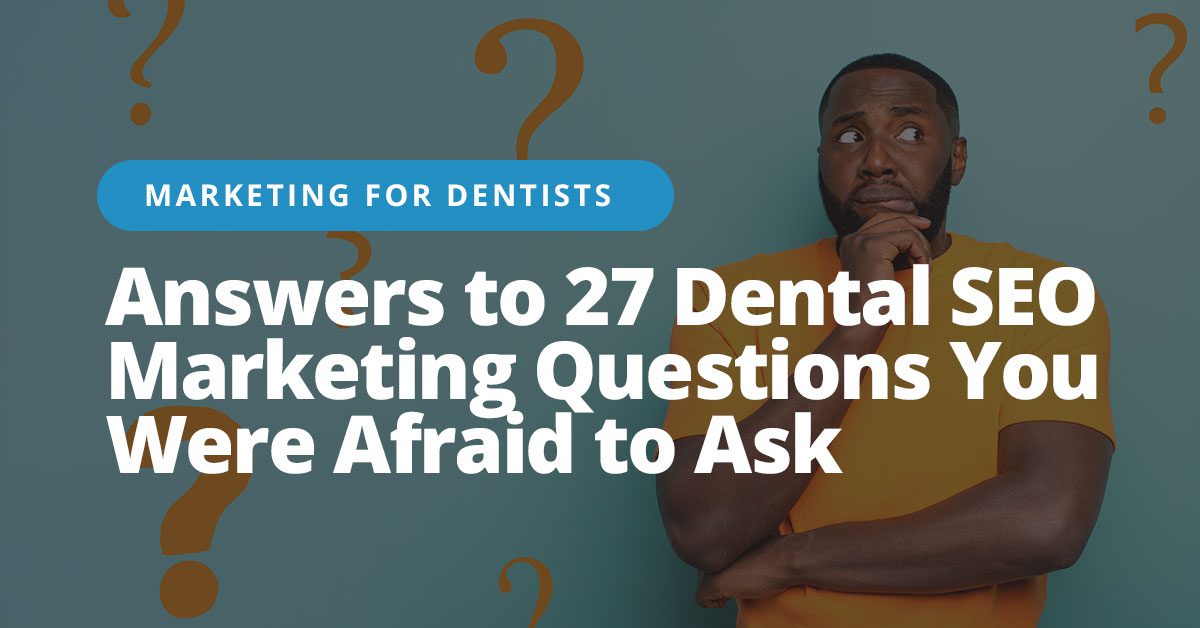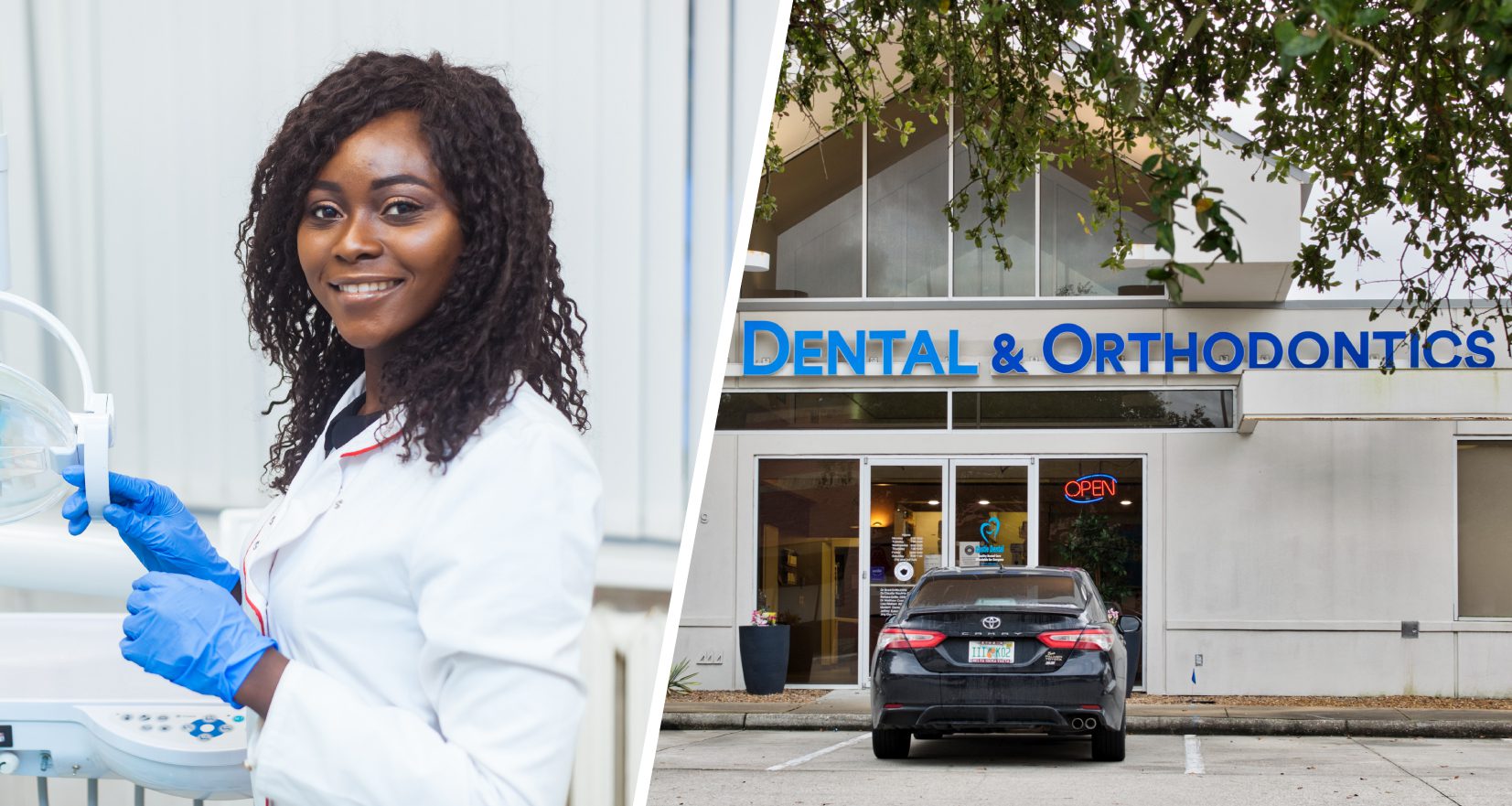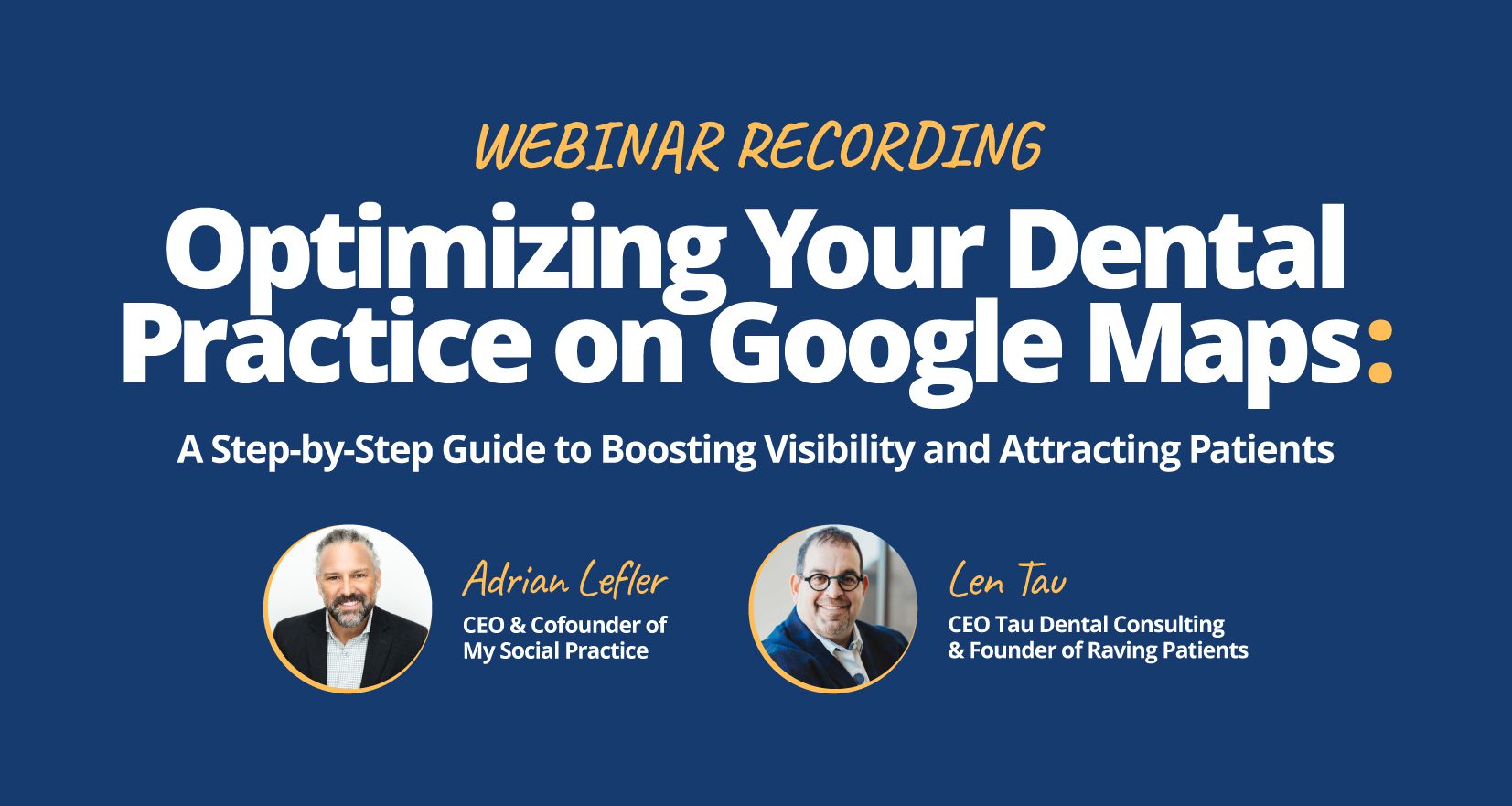Twelve years ago, when I first got into dental SEO marketing, I thought I understood everything. I knew that it stood for search engine optimization. I knew about link building and optimizing for Google maps, and I also knew that the goal was to rank higher in search engines.
But come to find out, I really didn’t know much. I had lots of questions, questions that I thought were naive. As I learned more about SEO, it created even more questions, questions that I was still afraid to ask. And even if I mustered up the courage to ask someone, I wasn’t sure who to ask.
Below are some of the questions that I asked along the way. My hope is to make your dental SEO education not as painful as mine.
Cheers!

Answers To 27 Dental SEO Marketing Questions You Were Afraid To Ask
1) What is dental SEO?
SEO is a type of marketing that aims to improve your company’s online visibility by increasing the number of visitors to your site. SEO stands for search engine optimization. It refers to methods that aid in the visibility of your website and other online assets like your Google My Business account and social media accounts. The improved visibility in search results will aid people who are looking for your brand, product, or service using search engines like Google, Bing, and Yahoo.
2) Why does my dental practice need SEO?
If you’re a dentist trying to bring awareness to your community about your practice, dental SEO marketing is a digital way of reaching them. SEO enables your website and other online assets, like your social media channels, your Google My Business account, and others, to appear high in the search results.
3) Why is it called a ‘blog’?
Web Journal = Web Log = Weblog = blog
4) What is the difference between hyperlinks and backlinks in dental SEO?
While they appear to be the same, these two ideas are quite different. A hyperlink is a linked keyword or website address. On the other hand, a backlink is a linked connection from someone else’s website to your website. Simply put, a hyperlink is a link to any website. A backlink is a link to your website on another site.
One of the most important aspects of dental SEO marketing is to increase and improve your dental practices online link structure.
5) What’s a good dental SEO marketing goal to set?
The best dental SEO marketing goal is a measurable one. When it comes to SEO, you should track the rankings of each keyword that you’re attempting to optimize. In local SEO, you’ll want to track the Google maps rankings and in organic rankings you’ll want to track the website rankings below the map.
Good tracking software to choose from are SemRush, Hrefs, or Moz.
6) How do I spy on my competitor’s dental SEO marketing?
You’ll need some dental SEO marketing software. Use one of the software systems in answer #5.
7) What’s the difference between dental SEO marketing and local dental SEO?
There are three places your practice is found in Google search results. Google Ads, Google maps, and the organic website results.
Local dental SEO refers to helping your Google My Business account rank higher in the Google map because these results are localized. Organic website SEO is for ranking in the website results below the Google map.
8) What does https:// mean?
(Hypertext Transfer Protocol Secure) Without all the snazzy nerd talk is simply means that the website is secure and encrypted when transferring information over a network.
9) Organic vs. paid results, what is the difference?
Organic results appear in search engines for free, based on the search engine algorithm. Paid results will appear at the top or side of a search results page. Paid results appear on different search engines like Google, Yahoo, and Bing.
10) What in the world is a web crawler?
Web crawlers are internet bots that browse and record websites to be indexed in the search engine. What most people don’t know is that when you do a search on Google, you’re not searching the internet, you’re searching an indexed version of the internet. If a Google bot doesn’t crawl your website, your website won’t show up in Google search results.
11) What is a web spider?
See the answer for #10.
12) When am I going to be on page 1?
The best answer, although unsatisfying, is that no one knows. And if anyone promises you a timeline, then you should probably run. Several unpredictable elements impact search engine rankings. These elements include page optimization, backlinks, hyperlinks, bounce rate, competitors, and updates in the algorithm.
13) What in the world is a meta description?
A meta description appears below your page link in a search engine result that explains what the page is all about. In this example, the meta description is “The most successful dental practice websites are correctly coded for SEO .”

Meta descriptions used to be a way that you could insert keywords to help rank your website, no so much any more. It’s far more important to write good content, content that people find valuable than to try and keyword stuff your meta descriptions.
14) Should I change my website domain name, and include keywords?
Your dental website domain should not include a keyword just for the sake of keyword optimization, because this can harm your dental SEO marketing. If your practice name happens to have a keyword, that’s fine, but don’t go out change your URL to, www.TheBestCosmeticDentistInTheWorldNearMe.com.
Get what I mean?
15) How do I know if I’m using the right number of keywords on a dental service page?
The number of times you use a keyword on a service page isn’t the right way to think about how to use keywords and page optimization. The reality is that you can be penalized if you ‘keyword stuff’, which means that you’re putting the keyword into your copy in awkward places.
The best course of action with keyword density is to try and write naturally and look for opportunities to use your keyword.
Another good tip is to use a SEO copywriting software like Yoast, RankMath, or SEMRush. These tools can help to guide the process.
16) What’s the difference between an inbound link and an internal link?
Inbound links are links to your website from another website. The person clicking the link comes ‘inbound’ to your website. Internal links are links that link internally from one page on your website to another page on your website.
Both types of links are valuable for your dental SEO marketing results.
17) How many internal links do I need on each page of my dental site?
A good rule of thumb with internal links is much the same as my response to question #15. Avoid creating internal links that are not necessary. It’s not helpful to your dental SEO marketing results. Include them when they are helpful to your readers.
18) Where is the “|” on my keyboard?
On a mac it’s right above the return button on the right hand side of your keyboard. I have no idea where it is on a PC, because I’m a snobby Mac user that looks down upon PC users.
19) If I want to do my own SEO, do I need computer coding training?
It’s helpful if you have a basic understanding of computer coding but it isn’t necessary that you receive training. Some advanced dental SEO marketing tactics require computer coding but you can get started without advanced coding.
20) What is robots.txt?
A robots.txt gives search engines information about the pages a company wants indexed or crawled. You can find your websites robots.txt by going to YOURDOMAIN/robots.txt.
21) What’s a sitemap.xml file?
The sitemap.xml file is a file that contains all of the pages that have been indexed of your website. The file is a quick reference for search engines to know which content you want to index.
We recently hosted an awesome dental SEO marketing webinar explaining exactly how to begin optimizing your practice for local SEO.
22) What is the difference between indexing a website and crawling a website?
A web crawler is a program that that searches your site. It checks meta-data, links, and other forms of content. The web crawler indexes the content in order for the content to appear in search results for that particular search engine. It’s important to know that not all content that the crawler, crawls, is indexed.
23) How do I know which of my web pages are indexed?
That’s pretty simple. All you need to do is search your domain and the pages you find listed in the search results are the ones that are indexed.
24) What is the point of adding alt text to the images on your website?
Google, Yahoo, and Bind search engines cannot read images. Alt text is added to the image allowing the search engine to read what the image is about. Another important aspect of alt text is that if your web images do not load properly, the alt text will usually load so that the visitor can read what the image is about.
25) How long will it take for me to the results of my dental SEO marketing?
There are a lot of different factors that play into how quickly a dental SEO marketing campaign works. Some of these issues are:
- The domain authority of your website when the campaign begins.
- The amount of new custom content that is created.
- The quality of the content and whether people read it.
- The strength of the inbound links you’re able to acquire.
- When the web crawlers index the new content.
A large site could see results in a couple of days if search engines crawl their site regularly. If you website is small it may take a few weeks for the web crawlers to re-crawl the site and index it.
26) Excuse Mr. Dental SEO person, what am I actually paying for?
SEO is a lot of copywriting and copywriting takes time, which means it isn’t cheap. If you are a dentist that likes to write copy, you’re more than half way there to becoming an SEO guru.
Another cost in dental SEO marketing is acquiring links. Many links require a cost.
It’s important to remember that when you hire someone to do your SEO your saving the opportunity cost, which is the cost of you not having to do it yourself.
I can honestly say, with what I understand now about SEO, I wouldn’t have hired myself ten years ago. But now, I’m worth every penny.
Need Help? We Provide Dental SEO Marketing.
If you are ready to take the next step to attract new dental patients through dental SEO marketing, but don’t know where to begin, My Social Practice is here to help. Fill out a form to get a personalized no-obligation dental SEO summary and quote. An effective SEO and marketing strategy can be one of the best investments you’ll make for your dental practice. We can’t wait to help your grow.
Dental SEO Marketing Related Articles:














